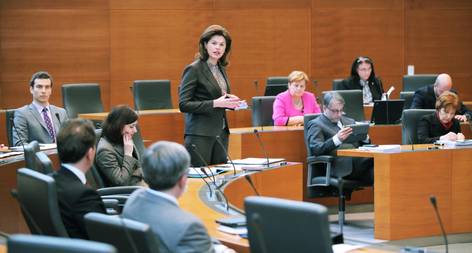NEWS
Prime Minister answers parliamentary questions: "The fight against economic crime and corruption will continue"
At today's session of the National Assembly, the Prime Minister of the Republic of Slovenia, Alenka Bratušek, answered questions raised by the deputies. As to the first question posed by NSi Deputy Jožef Horvat regarding the Government's scenario for the final stabilisation of the banking system and public investigation of persons responsible for the existing capital shortfall, the Prime Minister explained that it was important "to finally get the data, so we know what needs to be done, and that we do it ourselves. The amount is high, and we will find those responsible for the situation and hold them accountable. This is the first thing we must take care of. Next, we must make sure that something like this will never, ever happen again." She further recalled that the majority of non-performing loans in Slovenian banks had been created before 2009 and that the gross external debt had doubled in the period 2004–2008.
As to the question raised by SDS Deputy Zvonko Černač regarding the financial resources and the total amount of funding required to rehabilitate the banking system, and the reasons why Slovenia has not asked for support through the Single Resolution Mechanism, the Prime Minister explained: "So that we remain a sovereign state and that we ourselves decide on what needs to be done." According to the Prime Minister, "the fact that this will burden the taxpayers is indisputable. But it is also a fact that if we failed to do this ourselves, the consequences for our country would be significantly more painful."
The next question was raised by SLS Deputy Franc Pukšič, who wanted to know where the taxpayers' money went and where it will go, and who is the mysterious investor in the Slovenian bonds. In her reply, the Prime Minister pointed out that "in accordance with the established market practice in international markets, the Republic of Slovenia, like other issuers of securities, including other countries, does not disclose the names of investors. This also applies to bonds offered to a wider circle of investors in accordance with the rules. The disclosure of the investor's name would further complicate the issue of debt securities of the Republic of Slovenia, as it would deter other investors."
The last question to the Prime Minister was raised by the leader of the Positive Slovenia Deputy Group, Jani Möderndorfer, and concerned systemic measures to combat corruption. In her reply, the Prime Minister reiterated that she was sorry that the Anti-Corruption Commission had resigned, but that she had the feeling that they gave up halfway through. "But we have not, and therefore we will continue to fight corruption and economic crime," said the Prime Minister, explaining that the Government's doors were always open to the Anti-Corruption Commission. At the end of her answer to the last parliamentary question, the Prime Minister presented the statistics related to the fight against economic crime and corruption. She said: "In the first half of 2013, the police dealt with 49% more cases of economic crime. The highest increase, 95.4%, was observed in the area of fraud, followed by a 93.5% increase in money laundering and an 81% increase in offences relating to the abuse of position or trust in the area of economic activity. The police further dealt with 58.8% more criminal offences involving elements of corruption. The share of organised crime offences increased by 17.6%. Considering the data presented, can the three deputies say that the Government does not have a serious intention to deal with these offences? I guess, not."




